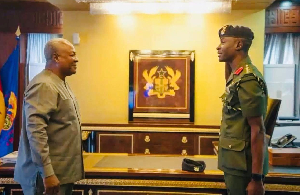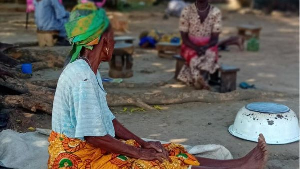If there is anything most people neither want to hear about nor talk about, then it is ‘death’. People hate death with all their lives; more so those whose loved ones have been forcibly taken away by death. Many are those who perpetually, have found it extremely difficult to overcome the indelible pain of losing a loved one. Such people refuse to partake when they hear ‘death’ being discussed anywhere. There are also those who don’t like attending burials. ‘Chalie, me I no dey go funerals koraa…’, ‘please let’s forget about this death issue and talk about something else…’ These are expressions we hear on a daily basis and they go a long way to indicate people’s apprehensiveness about the phenomenon of death.
It may interest you to know that there are people who dislike listening to Bernice offei’s award winning song ‘life is so short’ because it perpetually reminds them of the fact that life is short and anyone can die at anytime. There is no doubt that death remains the world’s greatest misery; man has invented amazing things that beat the imagination of man himself. Some of these inventions include the mobile phone, the computer and internet, and the aeroplane; man has undertaken heart transplants, plastic surgeries, and many more; yet he finds Death an unconquerable and indomitable adversary. Indeed, Franklin Roosevelt once said that ‘the only thing we should fear is ‘fear’ itself.’ And the fear of death, in opinion, is man’s greatest fear. People aren’t afraid of death for vague or unreasonable reasons; death has proven to be a phenomenal and irrepressible adversary. Death has proven to be ruthless and disrespectful to man in the discharge of his duties; in other words, he discharges his duties without emotions or sentiments. He is impeccably precise and amazingly efficient; when it’s time for death to take you away, he does that effectively irrespective of who you are: rich or poor; sick or healthy; young or old; beautiful or ugly. When it’s time, death takes you away, no two ways about this. The story is told of Kwaku who was sitting in front of his house, smoking cigar and laughing occasionally to himself, when he saw death standing in front of him. ‘Death, I hope you are not here to see me.’ He quickly asked. ‘Kwaku. I’m here to see you.’ Death replied. ‘Prepare, for in twenty-one days, I will be here to take you on a journey to a far place. Death added. Kwaku was terrified so death continued. ‘Buy a coffin and some white pieces of clothes for the journey; in three weeks I’ll be here to take you.’ He said before returning the way he had come. Kwaku rushed into the house where his wife was cooking in the kitchen. He was sweating like a Christmas goat. ‘My husband, what’s wrong?’ ‘Why are you looking this way?’ His wife asked eagerly. Kwaku quickly narrated his encounter with death to his wife. By the time he finished, tears had flooded his face. He broke down and wept like a child. His wife was also very worried. She went outside and returned after fifteen minutes. Ostensibly, she had been thinking of a way of saving her husband from his imminent demise. Kwaku, get ready, tonight we’ll leave this house. Kwaku couldn’t talk. A dying man is a desperate man, so he nodded his head in total agreement with his wife. Late into the night, the couple packed a few belongings and left the house for ‘a safe place, far away from the claws of death’. As Kwaku’s wife put it. Exactly two weeks later, Kwaku was sitting in the house; there was a broad grin on his face. He heard a knock on the door. ‘The small boy I sent to buy koko and akara must have returned.’ He said to himself. So he ran like Usain Bolt to the door. He opened it and saw death standing in front of him. He almost fainted. ‘I only came to remind you that we’ll be leaving in seven days.’ Death said with a wry smile on his face. Kwaku was still standing by the door ten minutes after death had left; he was petrified and greatly disturbed. The young boy whom he had sent returned with the koko and akara. Kwaku could only tell him to take it away. ‘Kojo, please go and drink it.’ Kwaku said weakly. The small boy was surprised. ‘Was it not this same man who said he was very hungry so I should hurry and buy the Koko for him?’ He asked himself as soon as he got out of Kwaku’s house. Anyway, ‘atadwin ma ti de en de; me, I’ll drink the koko and feel fine. He said. Kwaku was still standing there, in his room when his wife entered. ‘I’m dead, Ama. Death has come again oh!’ Sevens later, Death returned to Kwaku’s house. He met Kwaku’s wife at home. Where is Kwaku, didn’t I tell him we’ll leave today?’ Death asked her. He has just left the house, he said he wanted to get some items from the farm and that he won’t keep long; in fact he has bought all the items you told him to buy. That’s the coffin under the bed and here are the pieces of white clothes. Death was very pleased to see the items. ‘Alright, pound fufu for me, while I wait for him.’ He said. Kwaku’s wife didn’t hesitate; in one hour, fufu and nkatie nkwan with okoto, akrantie, and nwan nam was ready. Death also didn’t hesitate; he ate all and drank water. He relaxed for thirty minutes and still Kwaku hadn’t returned. ‘When will Kwaku return?’ Death asked Kwaku’s wife. ‘In fact I’m surprised myself; he should have returned long ago.’ Kwaku’s wife replied. ‘Alright, lay the bed for me and let me sleep; I hope by the time I wake, he would have returned. Death woke up four hours later and Kwaku still hadn’t returned. ‘Alright, I’ll take the lead.’ He said to Kwaku’s wife. ‘When he comes, tell him to meet me at the next town.’ He bent down and pulled the coffin from under the bed. It was usually heavy. Help me lift this on my head; when Kwaku comes, tell him I’ve taken the coffin with me; he should also bring the white clothes and the other items. Death was about to lift the coffin on his head when suddenly it opened and Kwaku came out sweating profusely; he was also crying. ‘Death, take me away!’ Take me away! I am a fool, I thought I could hide from you but now I know that no one can run away from you. Take me away! He cried. Death helped the weeping Kwaku lift the coffin on his head and led him away on a journey of no return. Like this story, no one can run away from death. When it’s your time, forget it. The phenomenon of death is incomprehensible to the ordinary man. Death defies logic and science; the greatest of men have all died. There are those who believe that people die as a result of certain decisions they take. In other words, a lot of people have died because they took the wrong decisions. I, honestly, am tempted to believe this. In October 2005, a Bellview plane crashed in Nigeria, among those who lost their life was a Nigerian couple who had been married for only two weeks. They did their wedding in Nigeria and came to Ghana for their honeymoon. After their honeymoon, they returned to Lagos where they boarded the ill-fated Bellview plane that crashed on its way to Abuja. One may argue that the couple took the wrong decision because if they hadn’t travelled to Ghana for their honey moon, they might still be alive today. Even here in Ghana, a friend went to the beach to swim. He saw a girl drowning and dived into the water to try to save her. Unfortunately for him, the girl, desperate to survive, dragged him into the sea with her and they both died. One may argue that my friend made the wrong decision because if he hadn’t paid attention to the girl, he would still be alive today. There is also the sad story of a Ghanaian man who had been living abroad for many years; he had become rich so he decided to come back to Ghana and help develop the country. He was driving in his brand new car, here in Accra one night when armed robbers attacked him, took his car and killed him. One may argue that if that man hadn’t returned to the country he would still be alive by now. Would you, however, in a situation where a young girl who was stirring banku in Accra walked outside to pour dirty water away, only to be knocked down by a lorry, say the girl made wrong decision? What was the wrong decision she took? Was going outside to pour water away a wrong decision or cooking banku in the first place? How would you describe a situation whereby a family of six sleeping peacefully at night is destroyed by an out-of-control lorry that broke down their single room and killed all six? What about the numerous people who have been killed by police stray bullets? What about those who after struggling to achieve something are killed by armed robbers and disposed of their valuables? Is becoming rich the wrong decision they made? It’s evident from the examples above that death is an incomprehensible phenomenon. It’s important that those who live in fear of death overcome their fear and accept the fact that everybody can die at any time. Why don’t we live our normal lives albeit meticulously without that perpetual fear of death because if you are afraid of death, you may die before your time. There is no doubt that our fear of death becomes stronger when someone close to us, or someone we know dies. We always feel we are next. However, we should make efforts to overcome that sort of fear with the belief that we are not afraid to die; after all, those who are dying are human beings like us and when the time comes for us to die, we will also die and go away. Say this to yourself and feel free; instead of harbouring fear that may eventually kill you before your time. Long live Ghanaians! Samuel K. Obour samuelkwason@yahoo.com.
The author is studying Communication Studies at the Ghana Institute of Journalism.
Opinions of Saturday, 22 August 2009
Columnist: Obour, Samuel K.














